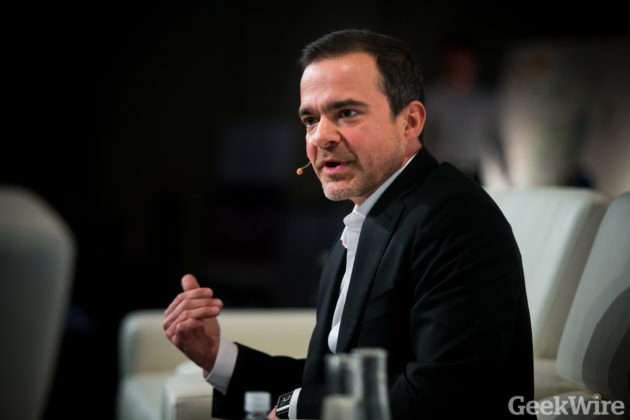
Building a successful company is hard enough. Being able to avoid becoming a large bureaucratic organization that stops innovating in the face of competition — that’s a different ball game.
Amazon has managed to avoid turning into, in its own description, a “Day 2” company. The saying “Day 1” has always been a mantra at Amazon since it launched more than 20 years ago, a reminder of sorts to maintain an entrepreneurial mindset on a quest for long-term success.
Products and services such as Amazon Web Services, Prime Video, and the Fire tablet are just a few examples of Amazon’s willingness to reinvent itself since starting as an online bookstore. The company is now worth more than $900 billion.
“Day 2 is stasis,” Amazon founder Jeff Bezos wrote in a shareholder letter last year. “Followed by irrelevance. Followed by excruciating, painful decline. Followed by death. And that is why it is always Day 1.”
Jeff Wilke, CEO of Worldwide Consumer at Amazon, shed light on this concept during a recent meeting with Amazon operations leaders. He provided advice for companies looking to stay away from “Day 2.”

To avoid wasting resources, Amazon has long prescribed to a “working backward” strategy for new products and features that force leaders to write a fake press release and FAQ page for new ideas. Wilke said they both need to be “really good,” and only then will Amazon fund one or two people to build a “two-pizza team” — another Amazon idea that forces internal teams to be small enough to be fed with just two pizzas.
“That’s a really good way to make sure we don’t start throwing hundreds of people at something in a less organized way,” Wilke said.
In annual shareholder letter, Jeff Bezos explains why it will never be Day 2 at Amazon
Wilke also said there can be too many people between senior roles and the employees actually doing work.
“It doesn’t mean the roles in between are less valuable,” he said. “But you have to get the right amount or you get the energy sucked up by self-preservation. Look at your own org and ask if it’s as efficient as I know it could be. When you stop improving it because you say “why should I suffer when that person over there isn’t?” that’s the beginning of the creep toward Day 2.”
Another way to avoid “Day 2”: don’t get lazy about learning. Wilke said Amazon’s newest leadership principle — “Learn and Be Curious” — is all about how to avoid complacency after achieving success.
“The ‘how’ is to focus on constant learning and staying curious about all things,” he said. “Curious about defects, curious about things in the world that aren’t right and you can improve, inventing for customers, the relationships among the people you lead.”
Other quick tips from Wilke:
Be yourself: “If you have something about you that’s memorable, reveal it because it makes you more authentic. Be yourself, even if it’s quirky or strange, as long as it’s respectful and not destructive. It’ll make you more endearing and seem more real.”
Questions to ask when considering a new idea: “How big is the opportunity? Can it succeed? Is it worth it?”
Do the right thing: “If you can hold up a mirror every day and be proud of the choices you made, you’ll have had a pretty effective day as a leader.”
On fast vs. slow thinking: “The best way for me to make sure the scrappy things I launch meet a high bar is to have assembled, over the years, a bunch of experience to apply as intuition, or fast thinking, to make these decisions. And then I apply one piece of slow thinking, which is reflection.”
You can read the full Amazon blog post here.



